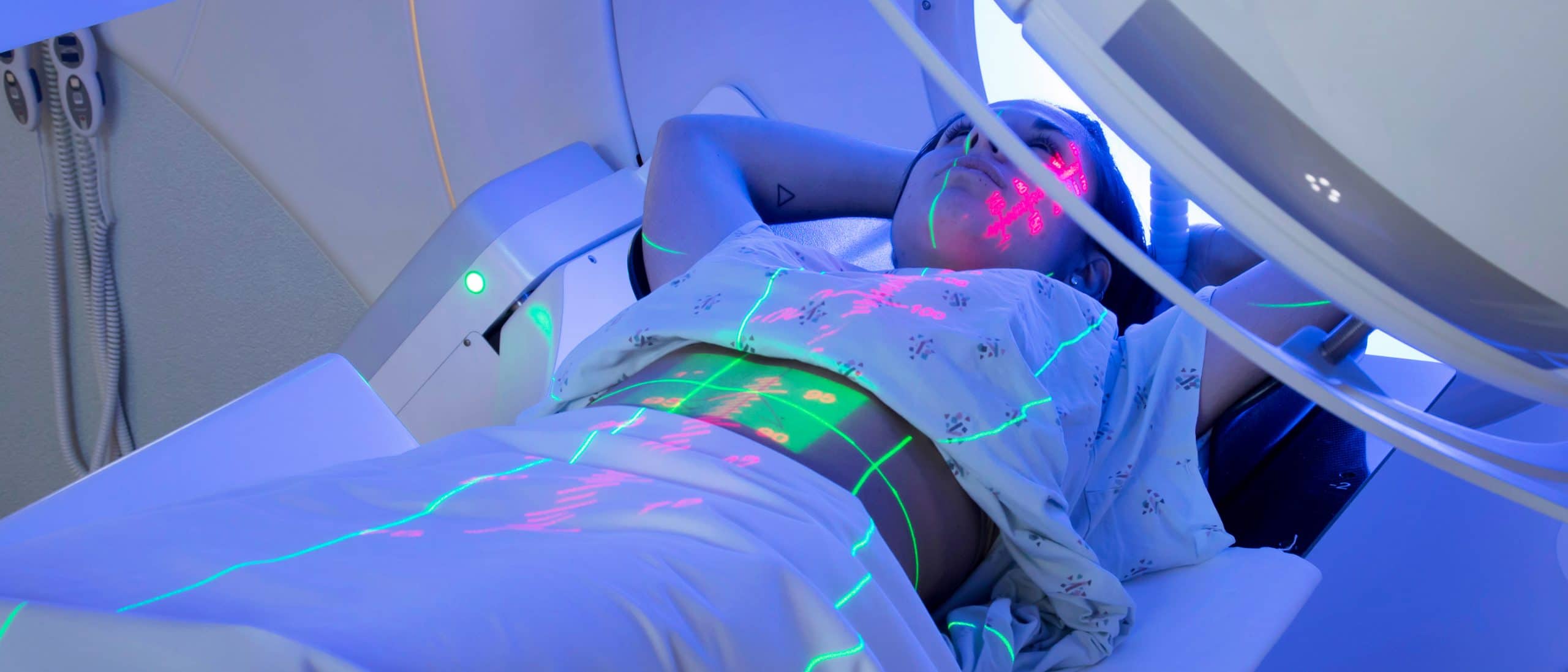Using Targeted Therapies to Treat Lung Cancer
Targeted therapies can efficiently locate lung cancer cells and stop them from growing and spreading. Learn how this can affect treatment.

What Is Targeted Therapy?
Targeted therapy is beneficial because side-effects are significantly less severe than those of other lung cancer treatments. Targeted therapies have reduced symptoms because they can “target” lung tumors and efficiently stop them from spreading. Comparatively, other therapies can’t tell the difference between healthy cells and abnormal ones, often killing both.

Types of Targeted Treatments
There are many different proteins, enzymes, and genes that enable cells to perform various functions. Therapies help locate specific abnormal cells and block these functions. Types of targeted therapy include:
Targeting Biomarkers
Targeting biomarkers are essential in moving forward with curative targeted treatments. Biomarker testing searches for DNA tumor irregularities. This can involve mutations, additions, deletions, or rearrangements in DNA. When these changes are observed through biomarker testing, the doctor can assess whether other targeted therapies will easily “target” these changes. This could give them a higher success rate.
Monoclonal Antibodies
These types of targeted treatments focus on blocking specific targets outside lung tumors. Monoclonal antibodies also send toxic elements directly to malignant tumors and help chemotherapy or radiation treatments reach unhealthy cells more efficiently.
- Immunotherapy – Immunotherapy is becoming more and more utilized in lung cancer treatment. It’s the most commonly used type of targeted therapy. Immunotherapies work to trigger the immune system and enable it to better locate and attack abnormal cells. They can recognize specific molecules on the surface of cells or bind to certain immune cells and help them efficiently destroy tumors.
- Kinase Inhibitors – Kinases act as enzymes and manage cell functions. These functions include cell signaling, growth, and division. Kinase inhibitors are small-molecule drugs that block malignant cells from performing these functions.
- Gene Expression Inhibitors – These inhibitors can modify the function of proteins that manage gene expression. Without gene expression, cell protein production is significantly reduced.
- Angiogenesis Inhibitors – Angiogenesis inhibitors stop abnormal cells from making new blood vessels. When this happens, the cell cannot retrieve the nutrients it needs to survive. Tumors are then starved and halted from spreading.
- Apoptosis Inducers – Apoptosis inducers streamline cell death. Apoptosis is your body’s way of ridding itself of abnormal or unneeded cells. When this process is induced, it’ll work more rapidly than before. This small-molecule drug allows your body to rid itself of malignant cells quicker.
- ALK Inhibitors – ALK is also known as anaplastic lymphoma kinase. ALK inhibitors halt the fusion between ALK and echinoderm microtubule-associated protein-like 4 (EML4). When these two elements fuse together, abnormal ALK proteins form that enable malignant cells to grow and spread.
- BRAF V600E Combination Inhibitor – Doctors may utilize this treatment in one to three percent of lung cancer patients. BRAF is a protein that sends signals and maintains cell growth. BRAF mutations can sometimes occur in patients and cause abnormal cells to multiply and grow excessively. BRAF inhibitors stop this function.
- EGFR Inhibitors – Also referred to as the epidermal growth factor receptor, EGFR is a protein located in abundance on some cancer cell surfaces. This protein can cause uncontrolled, abnormal cell growth, and survival. Inhibitors stop the production of EGFR and slow the metastisizing of tumors.
- RET Inhibitor – The RET gene gives the cell instructions for producing protein and signaling. It mainly works to signal types of nerve cells that are inside specific areas of the body.
- Resistance to Tyrosine Kinase Inhibitors (TKIs) – TKIs are substances that can block the development of tyrosine kinase enzymes. This enzyme facilitates cell functions like cell signaling, growth, and division. When TKIs are involved with tumors, enzymes are too active, causing abnormal cells to grow and spread out of control. TKI inhibitors inhibit this function and halt cells from growing. Patients sometimes develop resistance to TKIs because abnormal cells can mutate stronger and overcome treatment effects.
- ROS1 Inhibitors – ROS1 is a gene that can fuse with other genes and become abnormal, enabling tumors to metastasize. Inhibitors block this fusion.
Side Effects of Treatment
Targeted therapies sometimes cause adverse effects on patients, as with any lung cancer treatment. However, because targeted medications can efficiently locate abnormal cells, side-effects are much less severe than with other lung cancer treatments.
Some side-effects of targeted treatments include:
- Skin issues (rash, itchy and dry skin, nail changes, depigmentation of hair)
- Gastrointestinal perforation, or hole in bowels (rare)
- High blood pressure
- More prone to blood clots and infections
If you experience any of the above side-effects, contact your doctor immediately. They’ll be able to prescribe medication to help manage the discomfort and offer additional suggestions for moving forward.
Do I Need Targeted Therapy?
Sometimes treatments may not work with certain patients. If the tumor’s target cannot be located by targeting biomarkers, the doctor may recommend other treatments instead. These could include chemotherapy, radiation, or surgery. Additionally, cells could begin to resist therapy, meaning that the drug may stop working after a period.
Questions to Ask Your Doctor
Being diagnosed with lung cancer is an intimidating time. It can be helpful for you or your caregiver to have some questions ready for your doctor so that you don’t forget and get all the information you need.
Some questions to consider asking:
- What type of targeted treatment do you suggest? Why?
- What is the goal of my treatment?
- Is targeted therapy going to be the only form of treatment I get? If not, what other methods do you recommend?
- What are the details of my treatment? How will I receive the medication? How often? For how long?
- What will my everyday life look like after undergoing targeted therapy?
- Who do I contact with concerns or questions?
Your doctor will map out a specific treatment plan for you. Every patient is different and reacts differently to various treatment methods and combinations.


